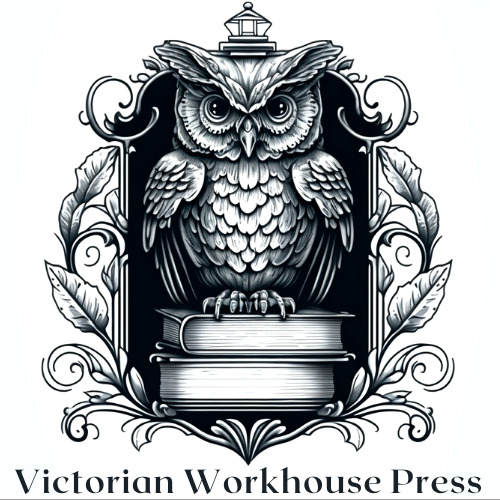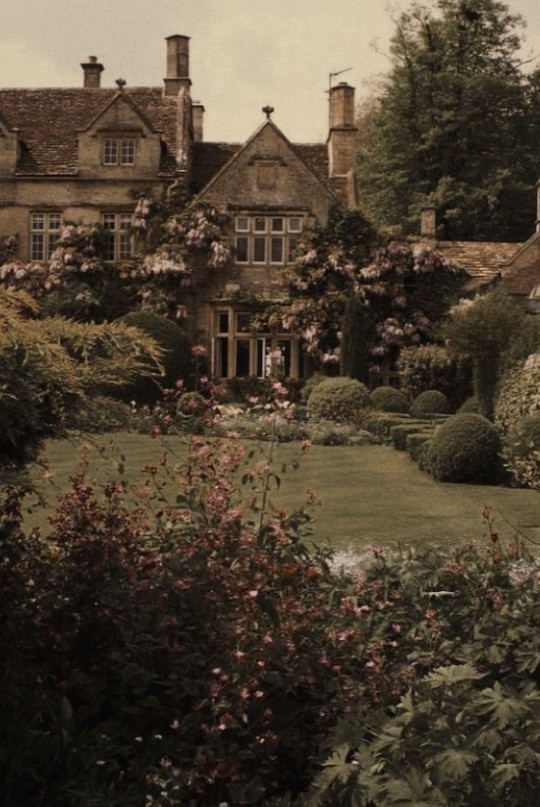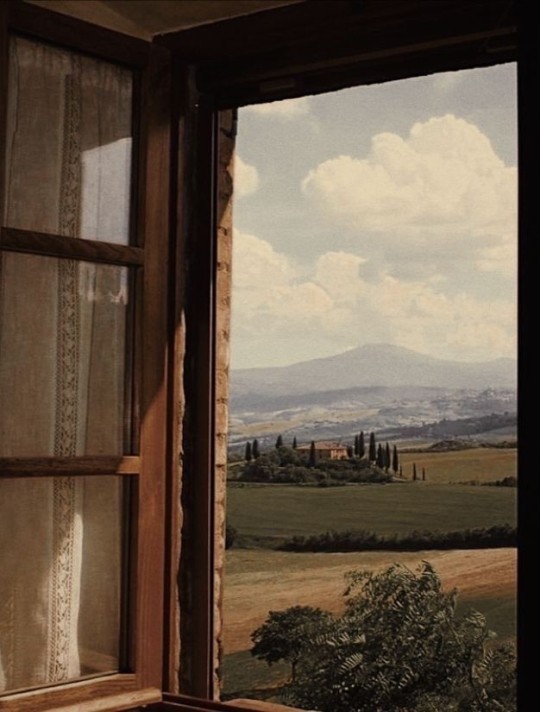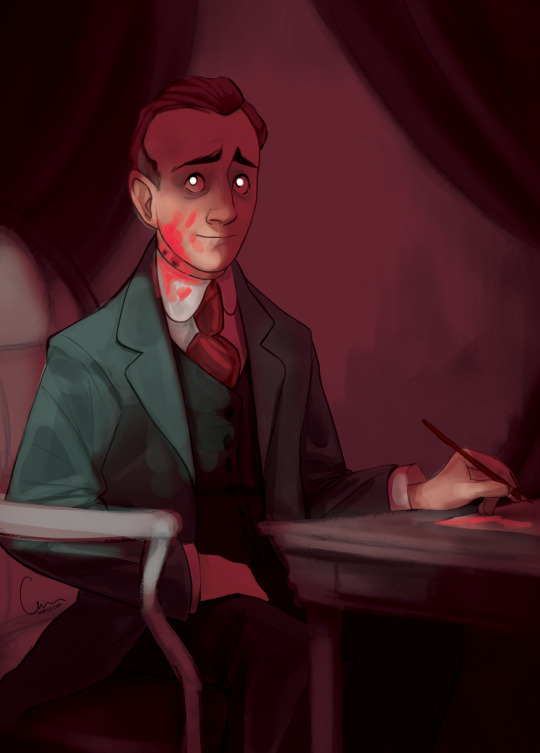#victorian lit
Text

The little man fixed on me his spectacles. A resolute compression of the lips, and gathering of the brow, seemed to say that he meant to see through me, and that a veil would be no veil for him.
'I read it', he pronounced.
'Et qu'en dites-vous?'
'Mais - bien des choses', was the oracular answer.
'Bad or good?'
'Of each kind, without doubt', pursued the diviner.
'May one trust her word?'
'Are you negotiating a matter of importance?'
'She wishes me to engage her as bonne or gouvernante; tells a tale full of integrity, but gives no reference.'
'She is a stranger?'
'An Englishwoman, as one may see.'
'She speaks French?'
'Not a word.'
'She understands it?'
'No.'
'One may then speak plainly in her presence?'
'Doubtless.'
He gazed steadily. 'Do you need her services?'
'I could do with them. You know I am disgusted with Madame Svini.'
Still he scrutinised. The judgment, when it at last came, was as indefinite as what had gone before it.
Villette, Chapter VII
#villette#charlotte brontë#lucy snowe#m. paul emanuel#my art#art#artists on tumblr#classic lit#victorian lit#ok so um I NEED TO SCREAM ABOUT VILLETTE TO SOMEONE . PLEASEPLEASEPLASEPLPSLDES#there's prob less than five people here whose blorbos are lucy and m.paul ... well count me in!
38 notes
·
View notes
Text
I completed Anne Brontë's Agnes Grey in one day yesterday. I'm in a book hangover, but here are my initial thoughts on the novel, as well as on Anne:
- Anne is an underrated Queen, but I already knew that from The Tenant of Wildfell Hall, her second novel. If only she hadn't died at 29! Agnes Grey was her first foray into novel publishing, and proves how much she developed her talents in the interim between itself and Tenant, which most people would agree is much better.
Yet, for a debut novel, Grey is nevertheless impressive. Her acute observations and descriptions of social experiences are some of the most clear I've ever read, and she was as adept in her satire as Jane Austen. After reading both her novels, Emily's only, and more than one of Charlotte's (Jane, and currently 1/4 through Villette) I can say she's certainly the most moral and progressive Brontë, and maybe even the most socially intelligent. There's a lot of humor in this book, and despite some of the dark themes, it never feels miserable.
Anne was a remarkably resolute woman, which comes through in both her heroines; even when they are oppressed and trapped in the most dire situations, they consciously refuse to adopt a victim mindset, instead trusting in their own strength and resilience. After enduring much suffering, both heroines trust in their faith, focus their energy on creating good lives for themselves, and by doing so achieve happiness in the end.
Anne Brontë's heroines are true examples of female stoics in the original philosophical sense, capable of great empathy and feeling as well as self-control and self-discipline. The Anne Brontë heroine has a quiet confidence about her. She champions moderation and common sense, not because she is boring or easily written off by the misogynistic epithet of "prude," but because she has witnessed true chaos and experienced true misery, and these things have served to make her more calm because she does not internalize them but triumphs over them. She has decided to learn from life's lessons and seek a life of tranquility, simplicity, and faith.
- This novel has everything! We've got the (literally designated) not-so-reformed rake in Sir Thomas Ashby (and what a rakish name that is), we've got some demonic children, we've got a sexy country parson, religious discourse, depictions and poignant criticism of classism, sexism, marriage, animal abuse, etc.
- Mr. Hatfield is basically Mr. Collins from P&P. Matilda rejecting him was golden.
-- The beginning of this novel, summarized: "I can't wait to meet these amazing children I've heard so much about! Gee, I really hope they aren't sociopathic animal torturers! What are the odds, am I right?"
-- No wonder the Brontë's didn't succeed in setting up their own school -- being a governess or teacher was simply horrible back then, as it largely still is today, and I think for the most part some of them simply weren't cut out for the job to begin with -- which is saying nothing bad about them or their abilities. Maybe if they lived today they would have done well as teachers or professors with a little more modern structure and having workers rights, etc...
-- I like the short length of this novel! It goes by very fast, and I read the first 100 pages or so myself very quickly, and the rest in audiobook format, but this is very rare for me. I've become accustomed to the Brontë family "language." I'm glad I didn't start with this novel though; I think it's easier to appreciate Agnes Grey after reading their "greatest hits" (Tenant, Jane, and Heights). It definitely isn't my favorite Brontë novel but then again I don't have a favorite. They each fulfill slightly different functions yet have many overlapping themes, so it's difficult to rank them.
-- I think one of the reasons this novel may not be as popular as it could be is because the first half of the novel is generally bleak and this may cause people to give up. The narrator's life generally improves in the second half of the novel, but still, Grey does not have as much dramatic "umph" as does what I hereby dub the "Brontë Greatest Hits Triad" (Heights/Tenant/Jane) which all will prefer. Still, the novel is worth reading for any Brontë fans as it is good and contains many of the Brontë tropes we all know and love. It also stands as a marked contrast to Anne's second novel The Tenant of Wildfell Hall, and makes me appreciate that novel so much better.
#the bronte sisters#currently reading#book thoughts#book opinions#agnes gray#anne bronte#victorian lit#lit#english literature#literature#books#reading
32 notes
·
View notes
Text
i’m team edward (rochester)
#classic lit#classic lit memes#classic literature#literature memes#book memes#jane eyre#edward rochester#mr rochester#victorian#english lit#english literature#victorian lit#victorian literature#charlotte bronte#charlotte brontë#the bronte sisters#bronte sisters#the brontë sisters#brontë#eyreposting
51 notes
·
View notes
Text
All Lesbian Coded Characters born in England between 1830 and 1899 know is horses, dogs, chivalry, obsession with maid/nurse, swordfight, duel sexists, hunting, wear trousers, smoke cigars and lie.
#except I trust them#It's that terrible old meme#but for victorian lesbian characters#stephen gordon#matilda murray#lady gerry starling#the well of loneliness#agnes grey#Tilly: The Progress of a Victorian Lesbian and Female Husband#victorian lit#female husands#historic fiction#shit posting#anne bronte#radclyffe hall#b. h. avondale#bookblr#victorian lesbians#butch feral horsegirl forever#yeah she's a specific lady but she's appeared in literature more than twice so I can't help that's a pattern#I'm sure I'd find her a few more times if I really looked hard enough#more awful memes for you#my chatter#brit lit#lesbian writer#writeblr#well of loneliness is a WWI novel so not Victorian but Stephen and her author Hall are Victorians by birth#and the novel reads more like a victorian novel than a modernist novel okay?#and yes Gerry is my character but she's a victorian lesbian too
102 notes
·
View notes
Text
The Summary of 80% of Historic Fantasy Novels, brought to you by someone who is constantly exasperated by its own genre:
"[Flowery vintage name that is often shortened] isn't like other girls. She doesn't like to gossip and doesn't give tuppence (groan) about fashion. She would very much rather read, thank you! But when [plot is introduced and the setting is often changed] she finds she is [important because of something she was unaware of and has no control over.] In this [trope-filled sexist disaster], she finds she will have to choose between [A male childhood best friend who's kind of mundane] and [dark and mysterious stranger who's probably not human.]" Written By Someone Who Has Definitely Never Had to Take a Bus.
🐸☕️
-Xanthe 🪶
4 notes
·
View notes
Text
reading the woman in white like damn my english teacher was right that plot sure can twist
#rambles#no spoilers i'm about 400 pages in#the woman in white#victorian lit#gothic lit#classic lit#english lit
4 notes
·
View notes
Text



I've made some logos and I'm trying to figure out which ones I like best for our books.
#victorian novel#victorian romance#victorian lit#victorian women#victorian#historical romance#regency romance#romance#regency#books & libraries
3 notes
·
View notes
Text
Notes to The Woman in White by Wilkie Collins :
Collins disapproved of the English custom of having women withdraw to another room after dinner. He claimed to have received a letter upbraiding him for his Francophilia: 'Sir, ... You are not English to the backbone. You have more than once set up the foreigners - the jabbering, unshaven foreigners, who live on kickshaws and sour wine - as example to us. I doubt whether you really believe that one Englishman is equal to two Frenchmen, and six of any other nation. I doubt whether you know your Rule Britannia as you ought ... Yours, J. Bull' ('A Breach of British Privilege', Household Words, 19 March 1859, p. 361)
this is what I talk about when I mean that the link between race and xenophobia is deep and also completely wild to learn about. and i read about how the english were racist to the germans by claiming they were so unromantic they gave sausages as romantic gifts
#the woman in white#english lit#victorian lit#wilkie collins#gothic#the stuff I have to read with my own eyes#although ngl a nice sausage could be a dope gift
6 notes
·
View notes
Photo

Carmilla by Sheridan Le Fanu
2 notes
·
View notes
Text






#dark academia#dark acadamia aesthetic#aesthetic#dark academism#books#dark acamedia#dark academia moodboard#academia#dark academia aesthetic#spring#spring aesthetic#vintage aesthetic#light academia aesthetic#light moodboard#light academia#lit#anne of green gables#spring academia#light academia moodboard#old aesthetic#victorian#aesthetic moodboard#vintage moodboard#moodboard#countryside#green academia#letters#dark academia books#bridgerton#old money
5K notes
·
View notes
Quote
Declining to reveal himself in correspondence, he is, perhaps, only glimpsed in the astonishingly fertile novels about human lives, desires, and choices, which were his enduring bequest to English literature.
Katherine Mullin and Francis O’Gorman, from the “Biographical Preface” to the Oxford World’s Classics edition of Can You Forgive Her? by Anthony Trollope
#anthony trollope#biography#enigma#elusive#private#writer#literature#english literature#english lit#classics#quotes#lit#words#excerpts#quote#victorian lit
1 note
·
View note
Text
Every night before you go to bed, ask yourself, "did I make the gothic lit authors proud?" and if the answer is no, go find the calcified heart of your lover to carry in your pocket.
#dark academia#gothic academia#darkest academia#chaotic academia#academia#vampire academia#light academia#goth#gothic#victorian gothic#gothic literature#gothic lit#mary shelley#bram stoker#edgar allen poe#charlotte bronte#gothic author#books#classic literature#literature
458 notes
·
View notes
Text
I feel like we as a society don't talk enough about how hard Cinna snapped when the Quarter Quell was announced
869 notes
·
View notes
Text




Something Is Very Wrong With The Harkers...
Designs for two Lenticular Paintings I desperately want to print and stick in gothic Victorian frames.
#art#Dracula#dracula daily#Jonathan Harker#Mina Harker#vampire#horror#gothic#victorian#goth lit#Dracula fanart#The Harkers#Character design#digital art#cw: blood#cw: horror#artists on tumblr
1K notes
·
View notes
Photo

Recent Reads 10/2022. All for my grad level Victorian lit class (there was more but these are the most recently read).
#Oliver Twist#charles dickens#anne bronte#agnes grey#the tenant of wildfell hall#take courage anne bronte and the art of life#samantha ellis#classic lit#victorian lit#19th century#biography#recently read#owned books#books#bookblr#brit lit#grad school
4 notes
·
View notes
Text
I've accidentally started a book club at school... A couple of the girls in my form asked me for a classic book recommendation for their English homework and I suggested Jane Eyre because they usually read a lot of YA fantasy romance and I remember being hooked by it when I was a similar age.
Fast forward a week or so and I'm now getting daily updates from their group of friends because they're so into it! They've taken over my classroom at lunchtime to have a chat about what's going on at Thornfield and are giving me some truly WILD predictions about what's going to happen. I've never seen a group of 13 year olds so mad about a classic and it's heartwarming to watch them experience the story for the first time. They're only about half way through the book and they're already looking for similar classics to read afterwards.
#books#reading#bookblr#booklr#school#jane eyre#charlotte brontë#victorian classics#classic literature#if anyone has any classic lit suggestions for 13 year olds that i can pass on then that would be great!
554 notes
·
View notes